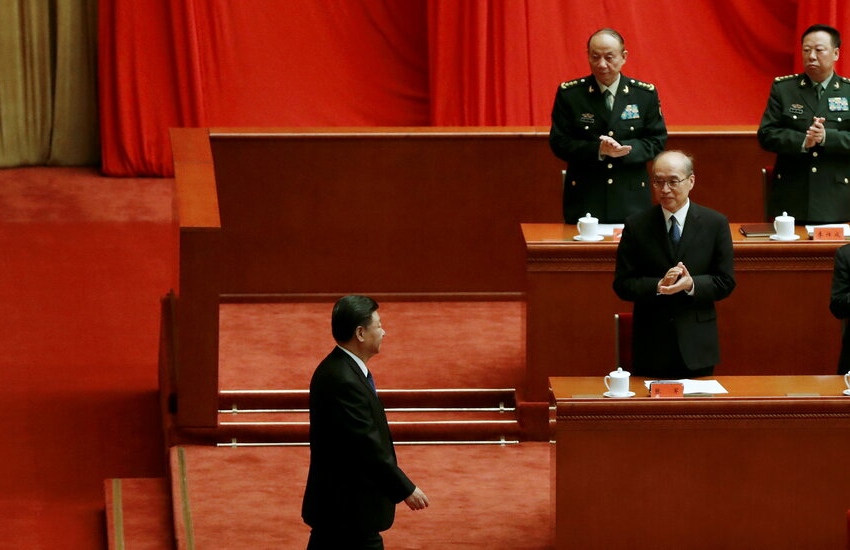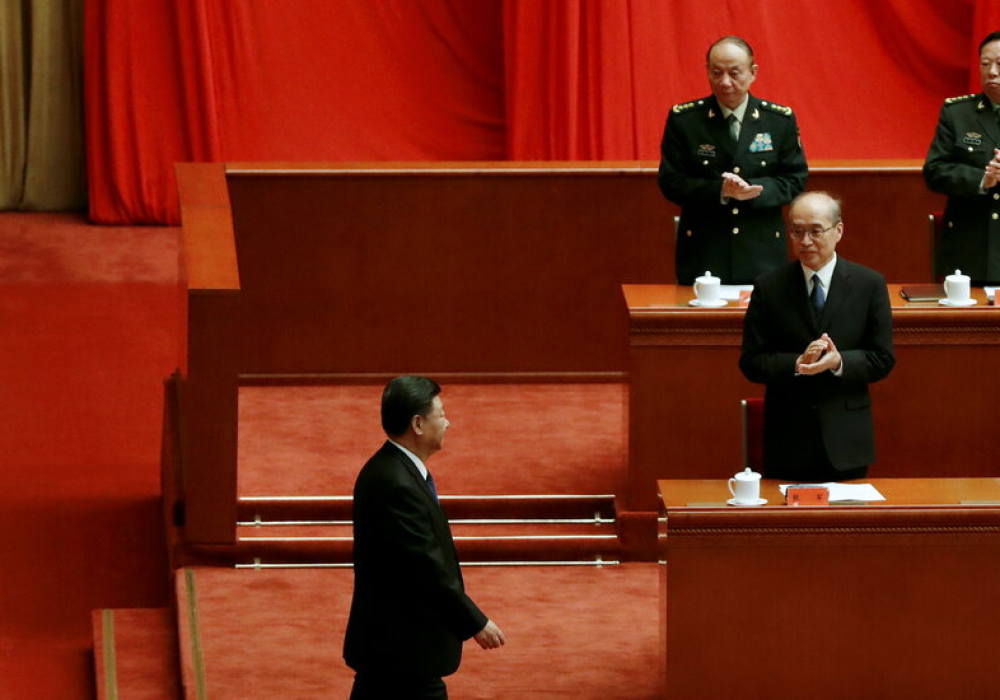
China’s Communist Party delivered Xi Jinping a breakthrough on Thursday that will help secure his political future — by rewriting history.
Senior party officials in a closed-door meeting in Beijing approved a decision reassessing the party’s 100-year history and enshrining Mr. Xi in the party’s official firmament of era-defining leaders. The move, signaled in an official summary of the meeting, elevated Mr. Xi to a stature alongside Mao Zedong, the founder of the country’s Communist rule, and Deng Xiaoping, the chief architect of its economic takeoff.
Under Mr. Xi’s leadership, China has “made historic achievements and undergone a historic transformation,” said an official summary, or communiqué, from the meeting, hailing what the party described as successes in the economy, foreign policy, fighting pollution and containing Covid. Under Mao, Deng and now Mr. Xi, the communiqué said, China had “achieved the tremendous transformation from standing up and growing prosperous to becoming strong.”
This week’s meeting was the start of a momentous year in Chinese politics. Its announcements will play a big part in the leadership shake-up at a Communist Party congress that is likely to be held in 2022, when Mr. Xi, China’s most powerful leader in decades, appears on track to secure a third five-year term as the party’s general secretary. There is no rival leader or heir apparent in view.
The decision to place Mr. Xi among the country’s historical giants will bolster his argument that he is the only leader capable of steering China toward superpower status through uncertain times. China navigated the Covid-19 pandemic relatively well, but it faces economic risks from debt-laden companies and local governments social pressures as its population gets older, and growing distrust from the United States and other Western countries.
On Thursday, in a recorded video to the Asia-Pacific Economic Cooperation forum, Mr. Xi urged Asian nations to resist forming “small circles on geopolitical grounds,” a clear reference to efforts by President Biden to shore up alliances of democratically minded countries to counter China.
“The Asia-Pacific region cannot and should not relapse into the antagonism and division of the Cold War era,” he said.
Mr. Xi has faced a succession of crises, but he has often been able to turn them into vindication for his hard-line ways. He responded to months of pro-democracy unrest in Hong Kong by imposing a harsh security law. He applied sweeping restrictions to limit the spread of Covid-19 in China. And Beijing claimed victory after Canadian authorities released Meng Wanzhou, a Chinese telecommunications executive, at the same time that China quietly released two Canadians it had arrested.
By claiming a third term as party leader, as he is expected to do next year, Mr. Xi would break the pattern of staying in power for only two terms. In 2018, Mr. Xi made a bold power play by eliminating a term limit on the presidency, opening the way for him to lead China indefinitely. That move overturned widespread expectations that the party had been settling into a 10-year cap on leaders’ time in power.
Glorifying Mr. Xi’s achievements could help fireproof Mr. Xi against any challenges to his record. The decision is sure to become the focus of an intense propaganda campaign, as well as indoctrination sessions for party officials.
Reporting and research by Chris Buckley, Steven Lee Myers, Liu Yi and Claire Fu.
The gathering of Chinese leaders in Beijing was officially focused on summing up the lessons of 100 years of Communist Party history. But the outcome of the meeting, distilled in an official communiqué, showed that they were focused on the future, in particular on extending the sway of Xi Jinping, China’s most powerful leader in decades.
The communiqué lavished praise on Mr. Xi’s policies since he took power in 2012, exalting his efforts to retool the economy, reduce pollution and poverty, and eradicate corruption. Under Mr. Xi, it stated, the Chinese leadership has shown “enormous political courage.”
“It has solved many tough problems that were long on the agenda but never resolved and accomplished many things that were wanted but never got done,” it said. “With this, it has prompted historic achievements and historic shifts in the cause of the party and the country.”
One sore spot for China’s leaders has been the criticism, especially from abroad, that its territorial claims and strident nationalist rhetoric have alienated other countries, especially the United States and its allies. But the party meeting gave no sign that Mr. Xi had any regrets.
“China has broken new ground in its diplomatic endeavors amid profound global changes and turned crises into opportunities,” the communiqué said. “These efforts have resulted in a marked increase in China’s international influence, appeal and power to shape.”
The party leaders also praised Mr. Xi’s policies in culture and political ideology. Since 2012, Mr. Xi has cracked down on liberal values and celebrity culture, while promoting a return to patriotic rectitude. “We have seen a sweeping and fundamental shift in the ideological domain,” the communiqué said.
The strong endorsement of Mr. Xi’s policies could become powerful political currency for him as he heads toward a party congress next year, when he is likely to gain another five-year term as the Communist Party leader. The Central Committee announced that the congress would take place in the second half of 2022, but offered no details.
This week’s gathering of China’s leaders took place behind closed doors, veiled in the secrecy that typically enshrouds the Communist Party’s deliberations, but once it ended on Thursday evening, the public, state-orchestrated adulation began.
The state television network, CCTV, extended its nightly newscast to a full hour, from 30 minutes. It showed the 348 members and alternate members of the party’s Central Committee voting, apparently in unison, to adopt the resolution on history that lays the ground for Xi Jinping to extend his rule to a third term as leader, and perhaps beyond.
Despite the country’s extraordinary measures to contain the coronavirus — or perhaps because of them — none of the officials in a chamber of the Great Hall of the People in Beijing appeared to be wearing masks.
On the evening newscast, an anchor read the final statement word by word. That was followed by the playing of “The Internationale,” the musical standard of the Socialist movement since the 19th century. Scores of comments posted online repeated the same phrase, word for word: “To seek happiness for the Chinese people, to seek rejuvenation of the Chinese nation.” Others, perhaps less exultant, seemed to have been blocked.
“They have not mentioned the three words ‘leader for life,’” said Willy Wo-Lap Lam, an adjunct professor at the Chinese University of Hong Kong who has long studied Chinese politics, “but it has been made beyond doubt that there’s only one leader capable of doing these marvelous things, moving China one step forward from a developing country to a superpower.”
The pomp underscored the importance of the meeting, but the historical resolution that the leaders adopted — only the third in the history of the People’s Republic of China — was not immediately made public. That is expected to come out in the days ahead.
The centrality of the party’s rule and Mr. Xi’s paramount role in it was nevertheless the dominant theme of the official coverage and the reaction.
Wu Qiang, an independent political analyst in Beijing, said that the proceedings signaled “a highly ideological governance” in the future emphasizing a cult of personal worship around the leader.
It was, he said, “an important turning point in the birth of a new totalitarian system in the world in the 21st century.”
Reporting and research contributed by Steven Lee Myers, Claire Fu, Liu Yi and Chris Buckley.
The meeting of the Communist Party’s Central Committee is a big deal in Chinese politics. The Central Committee brings together the party’s elite — about 200 central and provincial officials who have voting rights on its decisions, and 170 or so “alternate” members with no vote. The committee usually meets once a year to set the direction for politics and policy.
Past plenums have inaugurated major changes. A Central Committee meeting in 1978 set China on a path toward market reforms. One in 2013 approved a blueprint for Xi Jinping’s economic and social reforms. And another, in 2019, set in motion preparations for Hong Kong’s drastic national security law. Unusually, this latest meeting is expected to pass a resolution on Communist Party history.
The four-day meeting, or “plenum,” of the Central Committee lays the ground for a once-every-five-years party congress later in 2022 that will approve a new leadership lineup for China. Xi Jinping seems very likely to claim a third five-year term at that congress, bucking the two-term limit observed by his predecessor.
Even with his formidable power, Mr. Xi needs to carefully handle the party elite, heading off potential discontent and enforcing loyalty, and the meeting was a chance to do that. These plenums, though, take place behind closed doors, and we are unlikely to find out details about what Mr. Xi and other officials said about any plans for the coming leadership shake-up.
A decision on history sounds like an unusual move: Imagine if President Biden summoned lawmakers and governors to agree on an assessment of American history. But managing how the past is remembered has long been important to Chinese leaders’ claims to authority. And the new resolution on history that the meeting will issue has far-reaching implications by emphasizing that Mr. Xi’s plans, and his potential influence, extend for decades ahead.
Xi Jinping’s decision to devote a leadership conclave to rewriting the history of the Communist Party showed just how much controlling the past matters in Chinese politics.
For Mr. Xi, the move to put his personal stamp on the party’s history is a way of entrenching his authority — and shaping China’s political future.
In pushing through an authoritative “resolution” on the party’s past, Mr. Xi joined a select company of party leaders. Mao Zedong and Deng Xiaoping were the only others to oversee such resolutions, both to mark major political turning points.
Mao and his supporters introduced the party’s first resolution on history, in 1945, to consolidate his authority and condemn former rivals after years of internal conflict. That resolution was an important steppingstone in establishing “Mao Zedong Thought” — the party’s guiding set of beliefs that it carried to power across China in 1949.
Deng and other veteran leaders oversaw the party’s second resolution, in 1981, after they had returned to power following Mao’s Cultural Revolution, a decade of violent upheaval.
They faced a wave of bitter disillusionment with Mao, including among officials. But Deng worried that going too far in denouncing Mao would knock away a pillar of party authority. Mao was, after all, the founder of the People’s Republic. Deng and his aides crafted the resolution to renounce Mao’s destructive extremes in his final decades while defending his overall contribution.
Mr. Xi has shown no interest in delving deeply into the party’s past missteps. Instead, the latest resolution is likely to focus on consolidating Mr. Xi’s stature as supreme leader. Before the plenum, a surge of propaganda and a new official history of the party acclaimed Mr. Xi as a transformational leader who had led China into a new epoch.
The Chinese Communist Party’s drive to revive public faith in its history and values goes well beyond textbooks to include film, television, museum exhibitions — and even ice cream wrappers.
As part of Xi Jinping’s intensified efforts to control how Chinese people remember their past, the authorities have become much more energetic and a bit more skilled at packaging the party’s message for a wider audience.
“The Battle at Lake Changjin,” a two-hour, 56-minute film about an epic battle between Chinese and U.S. forces during the Korean War, became China’s second highest grossing film ever, helped by promotion from party authorities. This year’s celebrations marking the 100 years since the founding of the Chinese Communist Party also brought many celebratory television dramas and documentaries.
“In recent years you can see progress in propaganda using methods that are more acceptable to youth,” Kecheng Fang, an assistant professor in the School of Journalism and Communication at the Chinese University of Hong Kong, said in an interview.
At the same time, he added, censorship has tightened. “Skeptical voices have been steadily wiped out.”
The party’s commemoration of its past often dwells on heroic accounts from the revolution and China’s war against the Japanese invasions and occupation in the 1930s and 1940s.
The party has encouraged so called “red tourism” — monuments and museums where visitors are immersed in heroic stories from the party’s history. The famous ones include Mao Zedong’s hometown, and the mountainous Jinggangshan area where the Communist Party honed its rural revolution. The number of visits to “red” tourist sites has increased from 140 million in 2004 to 1.4 billion in 2019, officials say.
The party has recruited virtually every aspect of culture to promote its history. “Era of Awakening”-brand ice cream features lines from a patriotic television drama on its wrappers.
“I am a brick of the revolution, and I’ll be put wherever I’m needed,” reads one of them, for a chocolate-flavored ice cream.
Reporting and research by Chris Buckley and Liu Yi.
As the Communist Party recasts its official history, one question arises: What ever happened to Jiang Zemin and Hu Jintao?
The two leaders governed China for more than two decades, a period of phenomenal economic growth and growing international prestige. They presided over the country’s accession to the World Trade Organization, the return of Hong Kong and Macau to Chinese sovereignty, the launch of the first astronauts into space and the hosting of the Olympic Games in 2008.
And yet in the pantheon of Chinese leaders, they have increasingly been treated as placeholders, lesser leaders who served between giants, Deng Xiaoping and today’s ruler, Xi Jinping.
They have not been erased from history, as were others who fell afoul of internecine power struggles, but they have been overshadowed by the hagiography that envelops Mr. Xi, widely viewed as the most powerful leader since Mao Zedong.
In a recently released official history of the Communist Party, the roughly two decades when Mr. Jiang and then Mr. Hu served before 2012 are covered in about 100 pages. Mr. Xi, by contrast, receives 150 pages for his nine years —and counting — as leader. The statement released on Thursday mentioned each only once, while Mr. Xi’s leadership was extolled repeatedly, as it has been for months.
Mr. Xi , the official history says, inherited “many long-term problems that called for solutions but had not been solved,” including corruption and pollution, an implicit critique of their terms.
There was not hint of any such problems in Xinhua’s reverential biographical sketch of Mr. Xi in the days before this week’s gathering.
“Since being elected general secretary of the C.P.C. Central Committee in November 2012, Xi has been seen as a man of determination and action, a man of profound thoughts and feelings, a man who inherited a legacy but dares to innovate, and a man who has forward-looking vision and is committed to working tirelessly,” the state news agency gushed.
Susan L. Shirk, the chairwoman of the 21st Century China Center at the University of California, San Diego, said in an interview that the relative lack of attention and respect for the previous leaders signified shifts in policy that have taken place under Mr. Xi.
Mr. Jiang became General Secretary of the Party soon after Deng Xiaoping crushed the Tiananmen Square protests in 1989. He eventually emerged from Deng’s shadow, and pursued reforms that expanded private business and secured China’s entry into the World Trade Organization in 2001.
Mr. Hu, who succeeded him at party secretary and president in 2002 and 2003, was a button-down leader who governed by collective leadership and set the pattern of serving two five-year terms as leader, which Mr. Xi appears poised to break next year.
Mr. Xi has sought to reinforce the state’s heavy hand over the economy and restore a highly centralized political system with himself at the core.
“By downplaying the other leaders,” Ms. Shirk said of the history resolutions, “there are also policy implications that people should take seriously.”
As leader of China, Xi Jinping has pushed a nationalistic vision of a resurgent country brimming with new confidence. But Mr. Xi also faces complex challenges. The country’s sizzling economic growth rate has slowed. The coronavirus pandemic, first detected in China, has led to strict lockdowns as the country pursues a “zero Covid” policy of not tolerating new infections. The country’s leadership has faced condemnation from Western countries for its harsh treatment of largely Muslim minority groups in Xinjiang. A dispute over trade with the United States has escalated into broader tensions over technological rivalry and military moves. And massive protests in Hong Kong tested China’s leadership and led to a crackdown by Beijing.
History in China is not just about political legitimacy. It is an instrument of political control.
Recent changes to the country’s criminal code made slander of the country’s heroes and martyrs, as defined by the Communist Party, punishable by up to three years in prison.
Since March, the code has been used repeatedly to stifle questions about historical events that were once open to debate and research. Those include the revolution that gave birth to the People’s Republic of China and, more recently, a clash with Indian troops in 2020 along the disputed border in the Himalayas, where at least four Chinese soldiers died.
It has been used to jail prominent bloggers and journalists but also ordinary citizens. The intent is clearly to send a very public warning against deviating from party orthodoxy. A Chinese government directive issued this week ordered officials to ensure that memorial parks and other sites commemorating party martyrs are well maintained.
The weaponization of history comes out of an authoritarian playbook that other countries have also used to police dissent. Only weeks after the law in China was toughened, Russia made it a crime to slander veterans of World War II, a historical event that President Vladimir V. Putin has placed at the core of his political legitimacy.
“While it is absolutely not a uniquely authoritarian impulse to draw from a highly selective version of history and wage history wars to advance your own interests, in Russia and China it is becoming much harder and more dangerous to push back,” said Katie Stallard, a fellow at the Woodrow Wilson International Center for Scholars in Washington. She is the author of a forthcoming book, “Dancing on Bones: History and Power in China, Russia and North Korea.”
“The space for challenging the official version — which did exist previously — is shrinking,” she said. “Both frame their approach in terms of patriotism, but really it’s about securing the status quo and entrenching existing systems of power.”












